
The EON – The Greek fascist youth of Metaxas
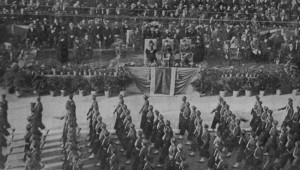 Given the limits on his personal power as dictator and a lack of a social base for his regime, Metaxas turned to the example set by the contemporary fascist regimes, deciding that the creation of a youth movement on the fascist model was the only way for him to acquire the social base he lacked. The example of how other fascist regimes went about the mobilisation of their youth had a great effect upon the direction which Metaxas took, in that he opted for the creation from above of a youth movement, as a principal means of mobilising the Greek youth.
Given the limits on his personal power as dictator and a lack of a social base for his regime, Metaxas turned to the example set by the contemporary fascist regimes, deciding that the creation of a youth movement on the fascist model was the only way for him to acquire the social base he lacked. The example of how other fascist regimes went about the mobilisation of their youth had a great effect upon the direction which Metaxas took, in that he opted for the creation from above of a youth movement, as a principal means of mobilising the Greek youth.
The indoctrination of the youth through the youth movement was the main expression of the fascist influence on Greece, but the way in which the movement operated in practice demonstrated that this type of imported organisation was inappropriate to the Greek case, and the youth movement disintegrated after the regime’s ending in April 1941. It proved impossible to achieve youth mobilisation from above without the slightest inclination from below.
Regime rhetoric: A healthy and disciplined youth
Much of the regime’s rhetoric on the youth issue was clearly imported from abroad, from the German and the Italian examples. The primary function of Greek youth, according to Metaxas’ fascist rhetoric, was to bring about an intellectual form of Greek nationalism, the “Third Hellenic Civilisation“. Young people had to have faith in their Greek identity, their Greek traditions and ideals and to consider Greece as their “Great Mother”.
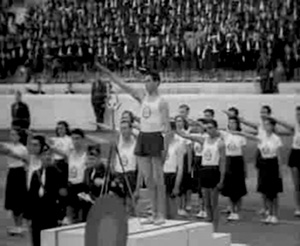 A creative and energetic life was expected of the youth. It was even claimed that ”a man, when he is a mere spectator of life, is a useless creature in the present society, an unnecessary burden “, reminiscent of the Nazi approach but fortunately only adopted in rhetoric. Influenced by the fascist notions of fitness and health, the leader tried to promote the exaltation of the lively youth.
A creative and energetic life was expected of the youth. It was even claimed that ”a man, when he is a mere spectator of life, is a useless creature in the present society, an unnecessary burden “, reminiscent of the Nazi approach but fortunately only adopted in rhetoric. Influenced by the fascist notions of fitness and health, the leader tried to promote the exaltation of the lively youth.
The exaltation of youth, while a prominent feature of the fascist ideology, was an integral part of a wider inter-war perception of the role of the youth. Youth organisations, whether of a liberal, fascist or communist nature, flourished during the inter-war period in most European countries.
Similarly, the 1930s intellectual climate in Greece included emphasis on the promotion of an active and healthy youth, contrary to the pessimistic perception of the intellectuals of the 1920s.
Metaxas professed a militaristic and very activist attitude towards life, clearly imported from the Italians and Germans, to accompany his “defensive” type of nationalism. Young people had to be healthy, strong and athletic and to possess a distinctive cultural education. The dictator was much more interested in developing an idealistic youth, which would create the “Third Hellenic Civilisation“, with a theoretical knowledge than one that could sustain itself materially and contribute to the nation’s well being.
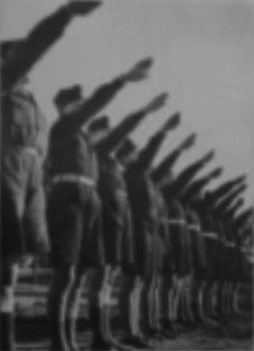 He stated that,
He stated that,
our basic task is to cultivate the general intellectual level of our youth; to transfer to the young people all this ammunition which will make them distinguished people who will not live like animals in their humble and materialist life, but who will feel the necessity of a higher, spiritual life given that the soul is in constant need of its own nutrition.
Metaxas’ paternalistic and highly moralistic teaching concentrated on behavioural characteristics such as discipline, obedience, struggle, the willingness to fight, decisiveness, which, he thought, would better enable the Greek youth to defend the country’s traditions and ideals. As such, the youth had to work together as a whole and not as separate individuals. They had to have courage, audacity, and conviction in order to be able to prosper, since only “through struggle, which is the greatest pleasure in life, can man realise the true meaning of life”. The youth could discover the new ideals by referring to traditional national values.
The fundamental ideals which the youth had to fight for, were “the King, the Country, the orthodox religion, the family and the 4th of August regime”. The most sacred ideal was devotion to the principles of the New State. In this way, Metaxas tried to reconcile the traditionally influential beliefs of the Greek people under the centralised supervisory authority of the 4th of August state. By retaining and strengthening the already dominant classicist orientation of Greek education, he presented the Greek youth with a selective classical interpretation of the national past.
EON: The Greek application of fascist mobilisation
As has been stated in the previous chapter, inter-war Greece lacked an influential fascist movement or a powerful fascist student movement. With the exception of the insignificant “National Pan-Student Movement” at the University of Athens, fascist ideas had made little impact among Greek youth. Due to the lack of a State-party and a social base which could support the 4th of August regime, the youth organisation was seen by Metaxas as the only party of his regime and the only way to strengthen his personal authority and challenge the power of the King.
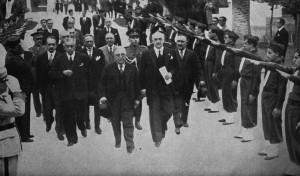 Metaxas aimed to put his thoughts regarding the youth movement into practice with the formation of “Ethniki Organosis Neolaias” (EON, the National Organisation of Youth), which he hoped would become the future of the regime. While the style and organisation of the youth movement were clearly imported from the Italian and German models of youth organisation, the leadership struggled to present EON as a uniquely Greek organisation which had nothing to do with the Italian youth of Mussolini, a Greek system which had its roots in ancient Athens, Sparta and Macedonia.
Metaxas aimed to put his thoughts regarding the youth movement into practice with the formation of “Ethniki Organosis Neolaias” (EON, the National Organisation of Youth), which he hoped would become the future of the regime. While the style and organisation of the youth movement were clearly imported from the Italian and German models of youth organisation, the leadership struggled to present EON as a uniquely Greek organisation which had nothing to do with the Italian youth of Mussolini, a Greek system which had its roots in ancient Athens, Sparta and Macedonia.
The Emergency Law No 334, (November 1936) brought EON into existence. Its article 3 declared:
The aims of EON are the profitable exploitation of leisure time from work or from school in order that the young people may promote their physical and intellectual training; the development of national morale and faith in religion; the creation of a spirit of cooperation and solidarity among them; and a prompt professional orientation relevant to each one’s natural capabilities.
Further articles of the law referred to the organisation’s rules, regulations, operations and finances. The movement was organised militarily into battalions, companies, platoons and squads, and a whole network of services. The members were divided into rank-holders: phalangists and pioneers. Those who were affiliated to Greek educational institutions or to the military were permitted to join EON.
Applicants had to be between 14 and 25, Greek Christians, “faithful to the principles o f the 4th of August regime”. Membership was voluntary in theory, but after 1938 it became practically compulsory. A Central Committee composed of the Ministers of Education, Railways, Public Assistance and the Minister-Governor of Athens was set up to draft laws and regulations for the organisation and to supervise its operations and finances.
The first EON sector was created in Salonica and was composed of the members of the previous fascist National Union (EEE). In Athens EON was initially formed by members of the anti-communist National Pan-Student Movement. In January 1938, EON had only 15,000 voluntary members in all the country, and it was during this year that Metaxas realised the failure of his youth project and decided that he had to fight personally for its future success.
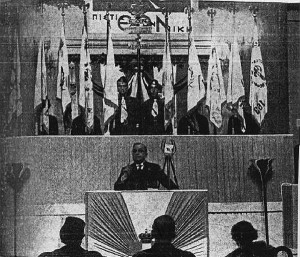 But he met the resistance of the King and the minister of education, among others, as to the organisation’s tactics and methods of recruitment. The main reaction came from prince Paul, the General Leader of the scouts, who objected to the submission of the liberal scouts movement to EON. Furthermore, the King suspected that Metaxas aimed at controlling the youth movement in his effort to strengthen his personal power.
But he met the resistance of the King and the minister of education, among others, as to the organisation’s tactics and methods of recruitment. The main reaction came from prince Paul, the General Leader of the scouts, who objected to the submission of the liberal scouts movement to EON. Furthermore, the King suspected that Metaxas aimed at controlling the youth movement in his effort to strengthen his personal power.
Towards the end of 1938, it was impossible to escape membership in the organisation. It was made compulsory, for all young people who qualified, to join. The movement extended gradually to include all the cities of Greece. Emergency Law 1798/1939 “On the National and Moral Education of the Youth” viewed the school and University educational mechanisms in close association with EON, under the supervision of the State.
Any other organisation with the same purpose officially ceased to exist, including the previous minor fascist movements. In addition the Scouts’ movement, one of the most important institutions under the King’s jurisdiction, which was organised on the British model, was incorporated into EON.
It was during this period that Metaxas started taking a more direct involvement in EON, through appearances and speeches. His speeches after 1938 had a more commanding force and he directed a markedly populist rhetoric towards the youth. Although Metaxas had achieved the consent of the king concerning his youth project, he was still very careful to remind the people that the king was the head of the state. By 1940, EON numbered just over a million members. On 30th March 1941 there were 1,030,314 of whom some 600,000 were in primary and secondary education.
Political indoctrination within EON: A fusion of ideas
Metaxas and the “intellectuals of the regime” embarked on a systematic socialisation process through speeches, “hours of indoctrination” (Wednesday afternoons), the magazine “H Neolaia”, leaflets and lectures on a variety of issues. The topics included lectures on nationalism, capitalism, parliamentarism, communism, state intervention, multi-party systems, the role of the family (the meaning of marriage, the importance of the mother, the way parents should bring up their children), religion, school, the arts and sciences. There was an effort to project a metaphysical adoration of the leader, who was presented as a divine personality with supernatural qualities.
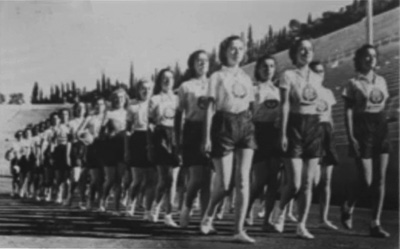 The instructors of the youth were usually gymnastics’ teachers and military officers. A Preliminary Draft for the Organisation of the Youth outlined EON’s methods of organisation and the duties of its members. Courses for boys included military drill, air raid defense, political enlightenment, propaganda, hygiene, athletics, topographical orientation, map making, signaling and reading. The girls’ activities included nursing, cooking and housekeeping.
The instructors of the youth were usually gymnastics’ teachers and military officers. A Preliminary Draft for the Organisation of the Youth outlined EON’s methods of organisation and the duties of its members. Courses for boys included military drill, air raid defense, political enlightenment, propaganda, hygiene, athletics, topographical orientation, map making, signaling and reading. The girls’ activities included nursing, cooking and housekeeping.
The regime’s position towards the role of the woman in society was very characteristic of its traditionalist character and, in agreement with the other fascist and conservative authoritarian regimes of the inter-war period, it considered the woman to be “the ornament of the house”. “The aim of the woman is to create and to look after the family all the time”, and only if additional money was needed by the family, was women’s work legitimised. In order to protect the girls from their association with boys, the regime abolished the mixed schools, “since mixed schools were part of the moral decadence of the Greek family, the corruption of many schoolgirls and the loosening of the male character of the schoolboys”. Women intellectuals were considered by the regime as a product of Western feminism while the ethics of Greek society taught that the woman is only a basic ingredient for the continuation of the Greek race.
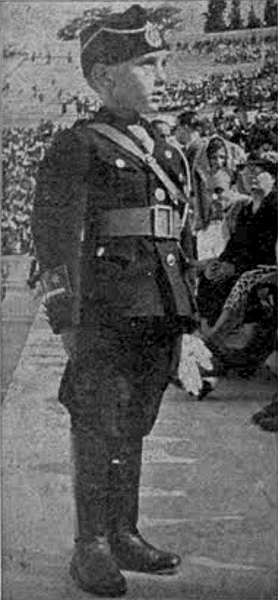 The EON, the Church, the School and Family
The EON, the Church, the School and Family
The position of the EON was in principle complementary to that of the Church, the school and the family, and at the same time self-sufficient in that it consisted of a united whole with a single national aim. The EON was composed of Christians and professed the practice of the Greek Orthodox religion. It was both a national and a religious organisation.
Additionally, the EON was claimed to be supportive to the school, but both of them retained their distinctive characters in that,
“the school does the intellectual training, EON does the moral andphysical training; the school is compulsory, EON voluntary; in school there are social inequalities, in EON there is social uniformity”.
The Greek family should entrust its youth to the movement, for parents should dedicate their children to the nation and agree with their education by EON.
“The family is the factory where human love and morality between people are constructed. It is the basis for the formation of a healthy society. There is a special relationship between the Greek family and the Greek nation. Family ties are subordinated to the citizen’s duty to the state.”
Overall, “the family creates the human being the school carries out their education… the Church does the religious training EON teaches how to struggle and fight”. The state, the church, the family and the school together should participate in the upbringing of the children.
Political practice of EON: Patronage and corruption
The rapid growth of the youth movement was due to official coercion and patronage. By identifying EON with the interests of the nation, the regime tried to justify at a moral level its intimidating practices in order to recruit those who did not want to collaborate with EON. Registration in EON became compulsory for school children and those who refused to join were faced with severe sanctions, like expulsion from school or difficulty in finding work. On the other hand, free uniforms and free admission to the cinema, official parades and recreational activities, as defined by the law, were used to woo the youth.
They used blackmailing tactics, promises for jobs in public positions and other financial compensations for those who were reluctant to join. For the cadres there were more solid attractions in the form of pay, allowances, the use of cars and access to official patronage. Emphasis on appearances, costumes, parades, fascist greetings, songs, hymns and festivities, very much inspired by the Italian and German examples, accompanied the organisation of the movement. Members used to wear blue uniforms, they saluted the leader with the Roman salute and bore the emblem of the organisation, the double axe.
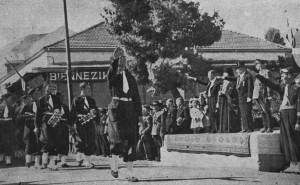 Contrary to Metaxas’ declared aim of overcoming the mentality of petty-party behaviour, which had condemned the country to social divisions, he created an organisation which operated in the same manner, with clientelistic networks and abuses of power. Moreover, there was a close collaboration between the military police, the armed forces and EON and the latter was heavily used as a sort of a youth police. A whole network of informers connected with the military police observed the actions of the members. Maniadakis, who declared that he admired the aims of the youth organisation and considered it the best creation of the 4th of August regime, was personally involved in the recruitment of its members.
Contrary to Metaxas’ declared aim of overcoming the mentality of petty-party behaviour, which had condemned the country to social divisions, he created an organisation which operated in the same manner, with clientelistic networks and abuses of power. Moreover, there was a close collaboration between the military police, the armed forces and EON and the latter was heavily used as a sort of a youth police. A whole network of informers connected with the military police observed the actions of the members. Maniadakis, who declared that he admired the aims of the youth organisation and considered it the best creation of the 4th of August regime, was personally involved in the recruitment of its members.
Despite the authoritarian character of the youth movement and its imitation of the Nazi and fascist models, the regime did not try to create a bellicose youth on the model of the Italians or the Germans, but placed a greater emphasis on the youth’s incorporation into the movement through games, athletics, cinema, holidays, excursions, which reflected the milder character of the Greek youth organisation compared to its foreign counterparts. It concentrated mainly on the youth’s leisure time and reproduced to a large extent the conservative ideology of the inter-war period by cultivating the concepts of nationalism, anti-communism, love of the King, religion and family.
The Greek youth movement was a source of friction between various social sectors who competed in the political education of the youth. The very issue of the status of the youth organisation in Greek society brought a disagreement between the King and Metaxas. Furthermore, the relationship between EON and the schools was seen differently by Metaxas and the Minister of Education, Georgakopoulos, which resulted in the latter’s dismissal and the take-over of the Ministry by Metaxas himself in 1938.
The influence of the movement on the children was of concern to their families. In other words the imposition from above of a youth movement which did not originate with the grass-roots was bound to create reactions, in a country were the family and the church controlled to a large degree the social upbringing of its youth. As the next extract shows, the existence of the youth movement created a lot of anxiety in many Greek social circles:
“EON is developing at such a pace that it threatens the family, the immovable foundation of Greek life….oral instructions were given to teachers to threaten the pupils with expulsion if they did not agree “willingly” to register with the movement parents in general tremble at the effects of the organisation on the youth’s morale and health……The attempted imposition of the youth movement on the school population is essentially an attempt to substitute the negative social base of the regime, by a positive sentimental base. But this long-term policy includes an offensive against family life, one of the most sacred things in Greek culture.”
Overall, the EON was a costly and at times a counter productive organisation which could not be imposed on the Greek mentality. Huge sums of money were spent on uniforms, parades, office rentals, furnishings and salaries for the organisation’s officers, financed by the public treasury. Although the formation of a youth movement was achieved and its membership expanded during the duration of the 4th of August regime, it never constituted the army which would defend the country during a war, as intended by its creator. On the contrary, the outbreak of war exposed its incompetence and inefficiency and brought the collapse of the organisation. Most of its members joined the subsequent resistance movements which were mostly organised by the leftist forces.
– Excerpts taken from “Authoritarianism in 20th century Greece”, by Othon Evangelos Anastasakis